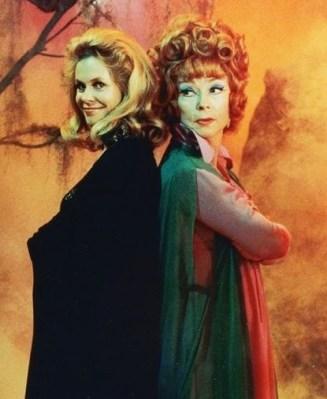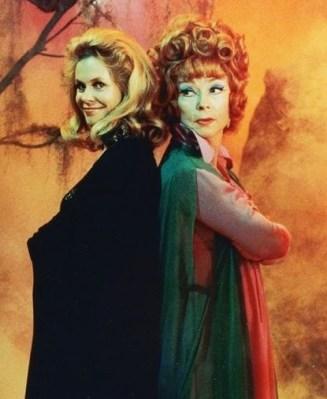May 24, 2021 by Maggie McNeill
We are quicksilver, a fleeting shadow, a distant sound...our home has no boundaries beyond which we cannot pass. We live in music, in a flash of color...we live on the wind and in the sparkle of a star!
- Endora (Agnes Moorehead)

 A couple of years ago I rewatched Bewitched, a show I always enjoyed in my youth but hadn't seen since the early '80s. I've always thought Elizabeth Montgomery was an excellent actress, but this time the magic of cannabis (which slows down my hyperactive nervous system so that I can really watch these shows in a way I've never been able to before) opened my eyes to just how talented she really was; she could convey so much with just her facial expressions and vocal manner, and her comedic timing was brilliant. But beyond that, I saw aspects of the show itself that were previously opaque to me. I've always recognized that many of the episodes are veiled commentaries on racism and other forms of bigotry; that was typical of the 1960s, when fantasy and science fiction shows could sneak controversial issues past uptight sponsors and network censors by disguising them as the stuff of alien worlds or magical happenings. When Samantha angrily denounced ugly witch stereotypes or mortals' fear of those who are different, the perceptive viewer understood what the show was really saying. As I grew older, I realized that there was also a more-deeply-buried queer subtext which was too radical even for most contemporary viewers who thought of themselves as liberal: beside the fact that several of the principals were played by gay men, Samantha had to hide her true nature in order to exist in the judgmental mortal world, and only in the company of other witches could she really be herself. Furthermore, those mortals were willing to hunt, persecute and even burn those like her merely because they were different. But queer people weren't the only sexual minority violently persecuted and actively hunted by 20 th-century puritans; while I'm sure it was unintentional, sex workers can also see ourselves reflected in this magic mirror.
A couple of years ago I rewatched Bewitched, a show I always enjoyed in my youth but hadn't seen since the early '80s. I've always thought Elizabeth Montgomery was an excellent actress, but this time the magic of cannabis (which slows down my hyperactive nervous system so that I can really watch these shows in a way I've never been able to before) opened my eyes to just how talented she really was; she could convey so much with just her facial expressions and vocal manner, and her comedic timing was brilliant. But beyond that, I saw aspects of the show itself that were previously opaque to me. I've always recognized that many of the episodes are veiled commentaries on racism and other forms of bigotry; that was typical of the 1960s, when fantasy and science fiction shows could sneak controversial issues past uptight sponsors and network censors by disguising them as the stuff of alien worlds or magical happenings. When Samantha angrily denounced ugly witch stereotypes or mortals' fear of those who are different, the perceptive viewer understood what the show was really saying. As I grew older, I realized that there was also a more-deeply-buried queer subtext which was too radical even for most contemporary viewers who thought of themselves as liberal: beside the fact that several of the principals were played by gay men, Samantha had to hide her true nature in order to exist in the judgmental mortal world, and only in the company of other witches could she really be herself. Furthermore, those mortals were willing to hunt, persecute and even burn those like her merely because they were different. But queer people weren't the only sexual minority violently persecuted and actively hunted by 20 th-century puritans; while I'm sure it was unintentional, sex workers can also see ourselves reflected in this magic mirror.
When I last watched the show, in my late teens or very early twenties, I naturally identified most with Samantha. But on this rewatch, I found myself identifying with her mother, Endora, due in part to her age, in part to her unique personal style, and in part to her attitude toward her daughter's marriage. I'm old enough to have a daughter in her twenties or early thirties, and I can certainly understand how I'd feel if she married a man I thought wasn't good enough for her. But it goes beyond that: the association between sex work and witchcraft is a very old one, and even today many sex workers metaphorically describe our work as "magic" (not to mention the many sex workers who actually do specifically practice witchcraft, though obviously not the fantasy TV variety). Endora's chief gripe with her son-in-law isn't really that he's mortal; it's that he wants to rob her beloved daughter of her birthright by forcing her to eschew magic and submit to mortal drudgery. And every time I heard her say this to Samantha (in quite a few episodes), I imagined how I would feel if my beautiful daughter gave up a successful career in sex work to marry a "dumbo" who demanded she renounce her heritage, shun her whore friends, and work a shitty square job when she could make far more with far less effort by doing what she's good at instead of letting herself be limited to behavior that doesn't make dreary, unimaginative authoritarians uncomfortable.
